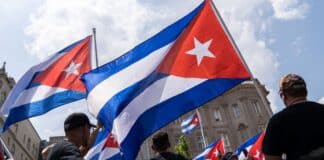China and Brazil signed a memorandum of understanding this week to study the creation of a transcontinental railroad from Brazil’s Atlantic coast to Peru’s Pacific coast. Chinese state media heralded the plan as a strategic alternative to the Panama Canal and a step toward tightening Beijing’s grip on Latin American infrastructure.
The rail line would link Brazilian exports directly to Peru’s Chancay port — a key shipping hub partially owned and funded by China. Trade analysts cited by China’s Global Times claim the project could cut shipping times to Asia by up to 10 days. The agreement is seen as a potential flagship project under Beijing’s controversial Belt and Road Initiative (BRI), which has drawn criticism worldwide for eroding sovereignty and causing environmental damage in underdeveloped nations.
Jorge Viana, CEO of Brazil’s Trade and Investment Promotion Agency, confirmed the project’s potential as a Panama Canal workaround, noting it would allow goods to travel straight to Shanghai without maritime detours.
The announcement drew attention to China’s increasing influence over global trade routes. Former President Donald Trump has repeatedly warned about Chinese operations in and around the Panama Canal, calling their presence “an abuse” and pledging to restore U.S. strategic control. Defense Secretary Pete Hegseth recently echoed those warnings, stating the Trump administration will work with Panama to remove Chinese influence from the region.
The proposed railroad faces steep logistical and environmental challenges, including cutting through the dense Amazon rainforest. Brazil’s Transport Ministry confirmed environmental studies will be conducted. The Chinese partner is the China State Railway Group, part of the world’s largest state-run railway enterprise.
Brazil’s leftist President Luiz Inácio Lula da Silva is deepening ties with China, continuing a trend started under conservative President Jair Bolsonaro. Lula has courted Chinese investment and praised Beijing’s role in vaccine distribution, while downplaying Western alliances. Despite Lula’s overtures, Chinese leader Xi Jinping has yet to visit Brazil, opting instead for Peru, where he celebrated the $1.3 billion China-funded Chancay port last year.
Panama, once part of the BRI, exited the initiative in February following diplomatic outreach from Secretary of State Marco Rubio. Peru’s own officials have lamented the Biden administration’s neglect of Latin America, noting that China filled the vacuum with massive infrastructure deals.





